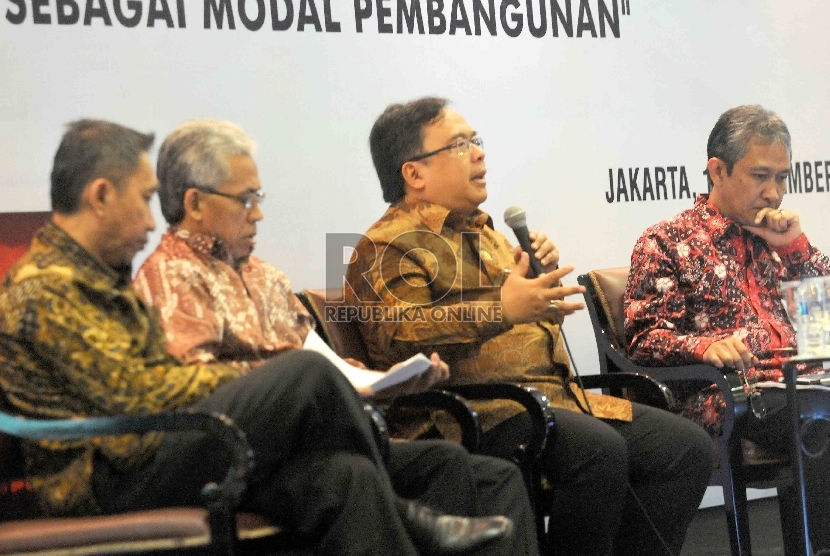REPUBLIKA.CO.ID, JAKARTA -- Finance Minister Bambang Brodjonegoro has proposed to the House of Representatives (DPR) a revision of the economic growth target from 5.5 percent to 5.3 percent in the 2016 draft state budget.
"We are proposing to revise down the economic growth target to 5.3 percent in 2016. This is lower than the target we had proposed in the financial notes at 5.5 percent," the finance minister stated at a working meeting with Commission XI on financial affairs of the DPR here on Monday night, (Sept. 19).
The hearing with the House's Commission XI was also attended by Bank Indonesia's (central bank's) Governor Agus Martowardojo, National Development Planning Minister Sofyan Djalil, and Central Bureau of Statistics (BPS) Head Suryamin.
The finance minister noted that the proposed revised target was more realistic in the face of the current global economic developments for the period of next five years without the need to lower optimism and the possibility of improving the situation in both developing and developed nations.
The optimism is evident from the global economic projection, which is forecast to be better than the conditions noted over the past two years. Yet, Indonesia needs to anticipate the possibility of a decline in China's economic growth in 2016.
"China's economic growth is forecast to slow down from the earlier prediction of 6.8 percent to 6.3 percent. The development of our economy is closely related to the developments in China, particularly our exports and imports. We have to be careful of unfavorable signs," Brodjonegoro pointed out.
According to the finance minister, although the growth target will be revised down, the economic growth in 2016 will still be supported by government expenditure --which gets a higher allocation in the draft 2016 state budget compared to the previous years-- and by investment, which would be boosted by the government's deregulation packages.
"Household consumption next year is forecast to be only five percent, or equal to the consumption this year, and is even predicted to be slightly weaker.
However, government expenditure can help. In addition, the government is making efforts to issue deregulation policies and to streamline the issuance process for business permits. All these measures could boost investment that could lead to growth," he emphasized.
Regarding other macroeconomic assumptions, such as inflation and three-month treasury bills (SPN), the government did not make a revised proposal. They are still set at 4.7 and 5.5 percent respectively. There will be ongoing efforts to maintain inflation from volatile food items, while the SPN rate is still higher than the inflation assumption.
Yet, for the assumption of the rupiah exchange rate set at Rp13.4 thousand per dollar, the minister has entirely left it to the assumption made by Bank Indonesia (BI).
The BI has projected the rupiah exchange rate to hover in the range of Rp13.7 thousand to Rp13.9 thousand per US dollar.
"We hope there will be a realistic calculation as the exchange rate has an impact on the oil and gas receipts and on the installment of external debts.
Though growth assumption might not affect the budget posture, yet the exchange rate will have an influence on it," the finance minister affirmed.
With regard to the rupiah exchange rate forecast for 2016, BI Governor Agus Martomardojo stated that his bank had made the projection based on its forecast that the rupiah would appreciate in the third and fourth quarters after it was recorded at Rp14 thousand per US dollar in the first quarter.
"The rupiah now is 'undervalued and overshoot' because of limited capital flow and the emergence of reversal conditions in the capital market. Many foreign exchange buyers and exporters are reluctant to release their dollar assets due to which the balance of payment had become negative in the second quarter.
However, the conditions will become more optimistic in the third and fourth quarters," the finance minister remarked.
The working meeting with House's Commission XI has yet to arrive at a decision regarding the government's proposal to revise down the growth target in 2016 as Fadel Muhammad, who chaired the Commission XI hearing Monday night, adjourned the meeting until Tuesday night (Sept. 22).
The growth assumption will be deliberated during the budget meeting by the House Budgetary Board.


